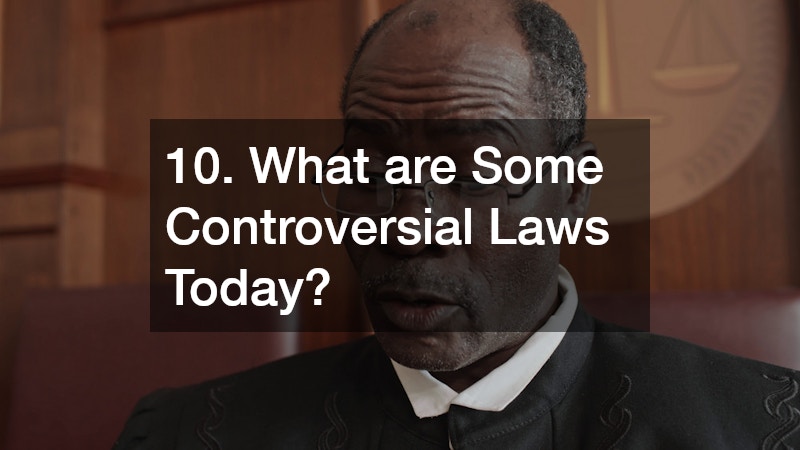Understanding the intricacies of laws is crucial for navigating our world. Legal systems are intricate frameworks that dictate the way societies function. Knowing fundamental facts about laws can significantly enhance your comprehension of how various aspects of life are regulated and governed. In this comprehensive guide, we delve into 10 essential facts about laws that every informed citizen should know. By grasping these principles, you can better appreciate the role that legal structures play in maintaining order and justice. This article aims to enrich your legal knowledge and empower you to understand how laws affect everyday life, ensuring you are well-prepared to engage with the legal system when necessary.
1. What is the Difference Between Criminal and Civil Law?

Criminal law and civil law serve different purposes within the legal system. Criminal law is primarily concerned with actions that are offenses against the public or state, such as theft, murder, and assault. These actions are deemed harmful and punishable by fines, imprisonment, or other sanctions. A local disability attorney often handles civil law cases, which involve disputes between individuals or organizations. These might include contract disputes, property disputes, or other personal grievances where one party seeks compensation or remedy from another. It is crucial to distinguish between these two fields of law as they dictate different procedures, penalties, and types of representation.
The burden of proof is another significant difference between criminal and civil law. In criminal cases, the prosecution must prove the defendant’s guilt “beyond a reasonable doubt,” a high standard due to the potential for severe penalties like imprisonment. Conversely, in civil cases, the plaintiff merely needs to prove their case by a “preponderance of the evidence,” meaning it is more likely than not that the wrongdoing occurred. This lower burden of proof in civil cases reflects the typically less severe consequences involved. If you consult an attorney regarding a case, knowing these distinctions can guide you in selecting the right type of legal assistance.
Attorneys specializing in criminal and civil law must understand distinct procedures and legal frameworks. A local disability attorney, for instance, operating mainly in the civil law arena, guides clients through legal processes that differ substantially from those in criminal law. In criminal cases, the state, represented by a prosecutor, is always the opposing party, while in civil cases, disputes are generally between individuals or organizations. By understanding these fundamental facts about laws, individuals can better navigate the legal landscape and ensure they seek appropriate legal counsel when facing legal challenges.
2. How are Laws Created?
Laws are created through a systematic process involving several stages of legislative activity. The process begins with the drafting of a bill, where legislators or lawmakers propose new laws or amendments to existing laws. This initial stage involves thorough research and drafting to ensure the proposed law effectively addresses the intended issue. An SSDI attorney, though not directly involved in lawmaking, must stay updated on new legislation that could affect clients’ cases related to social security disability insurance (SSDI).
Once drafted, a bill must pass through various legislative bodies for approval. These bodies include committees and chambers where lawmakers debate, amend, and refine the bill. Public input is sometimes sought during hearings or consultations to gauge the potential impact of the proposed law. After these deliberations, the bill is voted on; if approved, it moves to the executive branch, where leaders, such as the president or governor, may sign it into law or veto it. Understanding this process is a critical fact about laws, as it illustrates how public policy evolves from concept to enactment.
After a law is enacted, it continues to evolve as interpretations and applications are refined through judicial review. Courts assess laws to ensure they align with existing legal standards and constitutional principles. Legislative bodies may revisit statutes for amendment or repeal if inconsistencies or new societal needs arise. An SSDI attorney might track these changes closely to advise clients accurately, demonstrating the dynamic nature of the legal system and the ongoing development of laws. By comprehending how laws are created and modified, individuals gain insight into the legislative process that shapes societal norms and governance.
3. What are Common Law and Statutory Law?
The legal system comprises two primary sources of law: common law and statutory law. Common law is developed through judicial decisions made in court cases, which serve as precedent for future similar cases. These precedents, known as case law, guide judges in ensuring consistency and fairness across judgments. A child custody attorney, for example, relies on common law precedents to support their client’s case, drawing upon previous court decisions that may favor custody arrangements or dispute resolutions.
Statutory law, in contrast, is established through formal legislative processes. Statutes or enacted laws are codified and written down, providing clear and direct legal standards for individuals and entities to follow. These laws are passed by governmental legislatures and require strict adherence once enacted unless contested or amended through formal processes. In child custody disputes, statutory laws set the basic framework for determining custodial arrangements, albeit with room for judicial interpretation based on common law precedents.
The interplay between common law and statutory law ensures a flexible yet structured legal system. While statutory law provides foundational guidelines, common law fills in gaps and adapts to evolving societal values. A child custody attorney must often integrate both sources to effectively argue a case, using statutory obligations and common law interpretation to drive favorable outcomes. Recognizing the distinction and application between these two major sources of law is a significant fact about laws, helping individuals understand how legal precedents and statutes shape everyday decisions.
4. How Do International Laws Work?

International law consists of rules and agreements that govern the conduct of nations and other international actors. These laws address issues such as trade, environmental protection, human rights, and conflict resolution. The function and enforcement of international law often rely on treaties and conventions agreed upon by sovereign states. A department store injury has more challenges in an international context, as laws regarding such injuries may differ significantly from country to country.
International laws are established through mechanisms such as treaties, conventions, and international organizations like the United Nations. These treaties act as contracts between states voluntarily agreeing to adhere to specific standards and principles. Compliance is typically monitored by international courts or bodies that issue rulings or recommendations.
Enforcement of international law can be complex due to the lack of a centralized global authority. Nations voluntarily comply, motivated by diplomatic relations, economic incentives, or the desire to maintain international standing. When disputes arise—such as department store injuries involving international citizens—resolution often demands diplomatic talks, negotiation, or arbitration. Understanding the intricacies of international law provides insight into how global governance operates and how nations manage cross-border issues, making it an essential aspect of law for those engaging in international relations.
5. What is Constitutional Law?
Constitutional law is a core aspect of any nation’s legal framework, defining the principles by which governments operate. It outlines the structure of government, delineates powers, and protects individual rights. The primary source of constitutional law is the country’s constitution, which serves as the supreme legal document overseeing all other laws and government actions. A local patent attorney must often negotiate constitutional law’s principles, particularly when navigating intellectual property rights that may affect freedom of expression or innovation.
The implications of constitutional law extend to the balance and separation of powers among branches of government. By defining the roles and limits of legislative, executive, and judicial bodies, constitutional law ensures a system of checks and balances that prevents the abuse of power. When disputes arise concerning constitutional interpretations—such as those related to patents and innovation—courts may seek to safeguard fundamental principles while addressing modern society’s complexities.
6. What are the Most Common Types of Laws Found Around the World?
Laws vary greatly across different nations, reflecting diverse cultural, social, and economic backgrounds. However, some types of laws are almost universally recognized and implemented in various forms worldwide. These include criminal laws, civil laws, labor laws, commercial laws, and family laws. A work injury attorney specializing in labor or employment law often encounters legal systems designed to protect workers’ rights and ensure fair labor practices.
Criminal laws universally address offenses such as theft, assault, and murder, even though punishments can vary. Civil laws, on the other hand, govern disputes between individuals and organizations, covering areas like contracts, property, and family matters. Labor laws ensure worker protection, fair wages, and safe working conditions, highlighting the global emphasis on maintaining dignified employment standards.
7. How Do Laws Affect Freedom of Speech?

Freedom of speech is a fundamental human right protected by law in many countries. However, this freedom is subject to limitations to balance individual rights with community safety and order. Laws regulate speech to prevent harm, such as incitement to violence, hate speech, or defamation. An injury lawyer may need to consider legal regulations when handling cases involving freedom of speech that led to personal or reputational damage.
While laws protecting freedom of speech are essential for fostering open discourse and democracy, they require careful interpretation and application. Courts often weigh individual rights against the potential harm that certain expressions might cause, ensuring a fair balance is maintained. This balance is crucial in workplaces, publications, and public demonstrations to avoid harm while promoting dialogue.
8. What is the Role of Precedent in Law?
In legal systems, precedents are established through previous judicial decisions that guide future judgments. This principle, known as stare decisis, ensures consistency and stability in legal rulings by obliging courts to follow established case law. Precedents dictate how laws are interpreted and applied, shaping future case outcomes. Estate planning attorneys often rely on precedents to advise clients on property and inheritance matters effectively.
The use of precedent in law provides consistency, allowing courts to reference past decisions to maintain a coherent legal framework. This reliance not only reinforces legal integrity but also ensures the law evolves gradually to accommodate societal changes. For example, estate planning attorneys must be aware of precedents pertaining to wills, trusts, and probate to guide clients accurately through estate distribution processes.
9. How are Laws Enforced?
Laws are enforced through a combination of legal institutions, public agencies, and law enforcement officials entrusted with maintaining public order and upholding the law. This involves police to investigate and apprehend offenders, prosecutors to bring charges, and courts to administer justice. Chapter 7 bankruptcy attorneys, while not involved in enforcement directly, must understand enforcement mechanisms to prevent clients from contravening court orders during bankruptcy proceedings.
The enforcement process begins with law enforcement officials investigating potential legal violations, gathering evidence to support prosecutions. Following investigations, cases are presented in courts, where judges and juries assess evidence and determine guilt or liability. Sanctions, from fines and probation to imprisonment, are then applied based on judicial determinations, ensuring compliance with laws.
10. What are Some Controversial Laws Today?

The nature of laws often leads to debates, particularly those impacting social, ethical, or moral boundaries. Controversial laws elicit differing opinions, with supporters and critics voicing concerns about fairness, justice, and societal impact. Some current contentious areas include gun control, abortion rights, internet privacy, and immigration policies. Family attorneys may navigate these debates, particularly when laws affect family dynamics, such as same-sex marriage or adoption rights.
Controversial laws often reflect broader societal debates and require careful legislative and judicial review. Legal challenges are common, wherein courts may need to interpret constitutional protections and societal interests, affecting how laws are upheld or modified. Such changes underscore the dynamic nature of the legal system, continually adapting to new values and norms.
Conclusion
Understanding these facts about laws enhances your grasp of our legal system’s complexities, ensuring you are well-prepared to navigate its intricacies. Knowledge of fundamental legal principles, processes, and types equips you to interact confidently with legal structures affecting daily life. This empowerment enables active and informed participation in society, advocating for justice and informed citizenship. Awareness of the dynamic nature of laws—shaped by evolving societal values and judicial interpretations—emphasizes the importance of ongoing legal education. As you deepen your legal knowledge, you contribute to a more informed, equitable, and just society.




